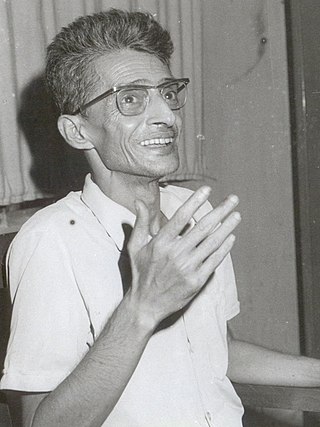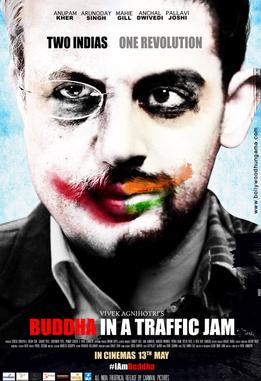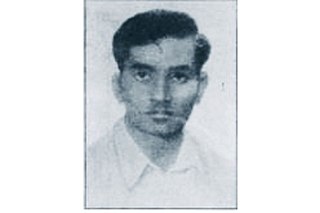Naxals or Naxalites are members of any of the communist guerrilla groups in India.
Naxal or Naxalites may also refer to:
Naxals or Naxalites are members of any of the communist guerrilla groups in India.
Naxal or Naxalites may also refer to:

The Communist Party of India (Marxist–Leninist) (CPI (ML)) was an Indian communist party formed by the All India Coordination Committee of Communist Revolutionaries (AICCCR) at a congress in Calcutta in 1969. The foundation of the party was declared by Kanu Sanyal at a mass meeting in Calcutta on 22 April, Vladimir Lenin's birthday. Later the CPI(ML) party splintered into several Naxalite groups.

Charu Mazumdar, popularly known as CM, was an Indian Communist leader, and founder and General Secretary of the Communist Party of India (Marxist-Leninist). Born into a progressive landlord family in Siliguri in 1918, he became a Communist during the Indian Independence Movement, and later formed the militant Naxalite cause. During this period, he authored the historic accounts of the 1967 Naxalbari uprising. His writings, particularly the Historic Eight Documents, have become part of the ideology which a number of political parties in India.
Naxalbari is a village in the Naxalbari CD block in the Siliguri subdivision of the Darjeeling district in the state of West Bengal, India. Naxalbari is known for being the site of a 1967 revolt that eventually led to the Naxalite–Maoist insurgency.
Kanu Sanyal was an Indian communist politician. In 1967, he was one of the main leaders of the Naxalbari uprising and in 1969 he was one of the founding leaders of Communist Party of India (Marxist-Leninist). Sanyal died by suicide on 23 March 2010.
Kondapalli Seetharamaiah was a senior communist leader and Maoist organizer in India.
The Historic Eight Documents are a set of eight monographs authored by the Indian Maoist revolutionary Charu Majumdar that outline the ideological principles on which the Naxalite militant communist movement in India was based. They laid down the idea that the Indian State was a bourgeois institution and that the main Indian communist parties had embraced revisionism by agreeing to operate within the framework of the Constitution of India. They urged a Maoist protracted people's war to overthrow the Indian State. They denounced the Soviet Union both for being revisionist, as well as for supporting the Indian State.

The Naxalite–Maoist insurgency is an ongoing conflict between Maoist groups known as Naxalites or Naxals and the Indian government. The influence zone of the Naxalites is called the red corridor, which has been steadily declining in terms of geographical coverage and number of violent incidents, and in 2021 it was confined to the 25 "most affected" locations, accounting for 85% of Left Wing Extremism (LWE) violence, and 70 "total affected" districts across 10 states in two coal-rich, remote, forested hilly clusters in and around the Dandakaranya-Chhattisgarh-Odisha region and the tri-junction area of Jharkhand, Bihar, and West Bengal. The Naxalites have frequently targeted police and government workers in what they say is a fight for improved land rights and more jobs for neglected agricultural labourers and the poor.
This is a timeline of the 1967–present Naxalite–Maoist insurgency in eastern India.
The April 2010 Dantewada Maoist attack was an 6 April 2010 ambush by Naxalite-Maoist insurgents from the Communist Party of India (Maoist) near Chintalnar village in Dantewada district, Chhattisgarh, India, leading to the killing of 76 CRPF policemen and 8 Maoists — the deadliest attack by the Maoists on Indian security forces.
Jangal Santhal, also known as Jangal Santal was an Indian political activist.

Buddha in a Traffic Jam is a 2016 Indian political thriller film written and directed by Vivek Agnihotri. The film released nationwide on 13 May 2016.
Satyanarayan Singh was an Indian communist politician. Singh was one of the early leaders of the Communist Party of India (Marxist-Leninist), being its secretary in Bihar.
Lal Jhanda Dal was a communist organization in West Bengal, India. It was one of several Maoist splinter groups that was active in West Bengal as of the late 1960s and early 1970s. The group was led by Swadesh Mitra. Swadesh Mitra had been a leader of the Communist Party of India (Marxist) in Calcutta, but formed part of an oppositional tendency. The Bolshevik Core tendency that Mitra belonged to had maintained contacts with the radicals in North Bengal.
Sushital Ray Chowdhary was an Indian Communist intellectual and founder member of Communist Party of India (Marxist-Leninist). He was the editor of the organs of the CPI, CPI(M) and CPI(ML). He eventually fell out with the mainstream Charu Majumdar group and died of a heart attack in March, 1971.

Saroj Dutta popularly known comrade SD, was an Indian communist intellectual and poet, active in the Naxalite movement in West Bengal in the 1960s. He was the first West Bengal state secretary of Communist Party of India (Marxist-Leninist). He also remained editor-in-chief of the Amrita Bazar Patrika during the 1940s.
The Srikakulam peasant uprising occurred from 1967 to 1970, in Srikakulam district, Andhra Pradesh, India. The Naxalbari uprising at the beginning of the Naxalite movement during the 1960s inspired the upsurge.

Naxalbari uprising was an armed peasant revolt in 1967 in the Naxalbari block of Siliguri subdivision in Darjeeling district, West Bengal, India. It was mainly led by tribals and the radical communist leaders of Bengal and further developed into the Communist Party of India (Marxist–Leninist) in 1969. The armed struggle became an inspiration to the Naxalite movement which rapidly spread from West Bengal to other states of India creating division within the Communist Party of India (Marxist) - India's primary communist party.
Dilip Bagchi was a Bengali mass singer, educationist and political activist. He was an active member of Indian People's Theatre Association of West Bengal.
Baccha Prasad Singh alias Balraj alias Arvind is an Indian Maoist politician and Politburo member of Communist Party of India (Maoist)

Jagdish Mahto was an Indian communist activist. He was a naxal leader who led the 1970 Bhojpur uprising in the landlord-dominated Bhojpur region of Bihar. He was a member of the Communist Party of India (Marxist–Leninist), an organisation which was leading the Naxalite insurgency against the Government of India. He also fought against the upper-caste landlords for the cause of lower-caste people. Mahto, also called Master Saheb, was a member of the Bihar State Committee of CPI(M–L) and one of the founding leaders of the party in Bhojpur.